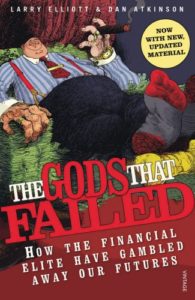The Gods that Failed by Larry Elliott & Dan Atkinson
 Alas, but despite the positive reviews from some for The Gods that Failed, I found it a book that was long on rhetoric about how awful much of the world is, but rather short of evidence to back-up the arguments and even skimpier on solutions.
Alas, but despite the positive reviews from some for The Gods that Failed, I found it a book that was long on rhetoric about how awful much of the world is, but rather short of evidence to back-up the arguments and even skimpier on solutions.
First, the good bits of the book: it’s a lively and passionate account of not only the financial markets but also much of modern life, looking widely at things that have gone wrong. Despite having come out in 2008 and so being written before much of the recession, it does not read like a work that has been over-taken by events.
But at over 300 pages, it’s a long book for one that is pretty much only about how awful many people are and the very breadth of its condemnations means it verges into Victor Meldrew territory with a picture of the authors seemingly disliking almost anything that has changed in the last 60 plus years. The authors so frequently criticise any relaxation of regulations (with little in the way of evidence or argument as to why any specific deregulation was wrong) that they paint a picture of them never having met a regulation they didn’t like. Except that the love of regulation is accompanied by an extended riff on how bad it is that the state employs many people whose job it is to tell others what to do. It is only in a brief mention right at the end that an attempt is made to reconcile this odd juxtaposition of “regulation – good” and “telling people what to do – bad”.
Certainly it’s not a traditional left-wing view the authors promote because they also merrily criticise the public sector in a way that sounds more like the Taxpayers’ Alliance when they criticise Kingston Council for employing someone (one whole person!) to focus on under-achievement amongst ethnic minority pupils despite the area having “one of the whitest populations in London”. Of course, it takes only a moment’s reflection to realise that saying something is low isn’t the same as saying it is so low that having one person is one too many.
The occasional good insight (such as just how many hours American financiers spent playing golf whilst their firms were collapsing) is mixed with the Victor Meldrew tone leading off into implausible directions, as when a good point about how often the rich do not make use of the services they insist are good enough for everyone else then leads on to the weird jibe that “journalism [is] a trade allegedly now in competition with its own customers” as they disparage the idea that journalism is really under threat from content provided for free by non-professional journalists. There’s a one word response to that, starting with B… I mean “Blogs?” of course.
Similarly, a potentially intriguing quote from a financier about how complex and risky financial instruments were never bought by the smart insiders but foisted off the unwary is not followed by any evidence about how widespread this was and even, a couple of pages later, is contradicted by a different quote from another financier – also criticising the financial system but this time saying that people in the know didn’t actually know how much of these instruments they owned. So, didn’t know or didn’t have? The contradiction is left unexplained.
Even the final chapter, promising specific policies for the future, uses up two-thirds of its length on more of the lively rhetoric before actually getting to the ideas. Had the book started here and then expanded on the ideas and thrown in some rhetoric about how the past showed how much they are needed, it could have been an excellent book. Instead we’re left with sections such as a rhetorical question about how can decent pensions for all no-longer be afforded? Well, there are lots of debates to be had over how an ageing population which lives for much longer on average after retirement than when state pension schemes were put together can be provided for. But just to state that it’s implausible for anyone to think old pension arrangements may no longer be affordable is an extremely weak argument.
Leave a Reply